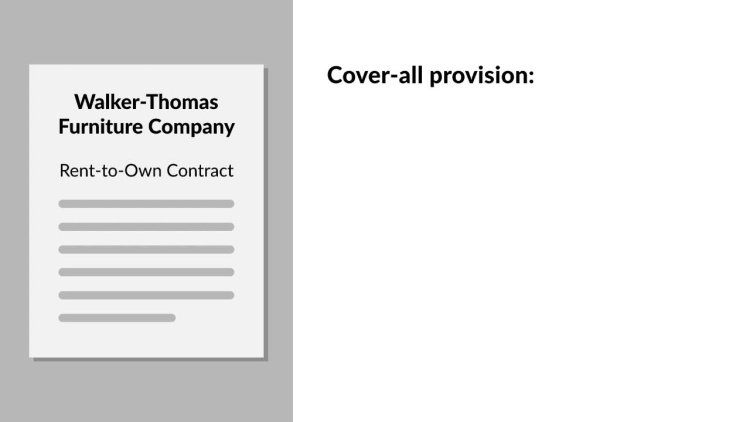Williams v. Walker-Thomas Furniture Co.
United States Court of Appeals for the District of Columbia Circuit
350 F.2d 445, 121 U.S. App. D.C. 315 (1965)
- Written by Megan Petersen, JD
Facts
Walker-Thomas Furniture Co. (Walker) (plaintiff) owned and operated a retail furniture store. It routinely leased items to customers under lease agreements that provided that customers would make a series of installment payments. Walker would retain title to the items until all payments were made, at which time title would pass to the customer. All Walker’s lease agreements also contained a unique provision that every time a new item was leased by a customer, a balance would become due on all items previously leased by that customer until the entire balance for all items was liquidated. The effect of this provision was that if a customer defaulted on his most recent purchase, Walker could attempt to repossess all previous purchases by that customer. Williams (defendant) purchased a stereo from Walker and defaulted shortly thereafter. Walker brought suit to recover on the stereo as well as all other items previously purchased by Williams. The trial court granted judgment for Walker, and the appellate court affirmed. Williams and other defendants appealed to the Court of Appeals for the District of Columbia Circuit.
Rule of Law
Issue
Holding and Reasoning (Skelly Wright, J.)
Dissent (Danaher, J.)
What to do next…
Here's why 907,000 law students have relied on our case briefs:
- Written by law professors and practitioners, not other law students. 47,100 briefs, keyed to 996 casebooks. Top-notch customer support.
- The right amount of information, includes the facts, issues, rule of law, holding and reasoning, and any concurrences and dissents.
- Access in your classes, works on your mobile and tablet. Massive library of related video lessons and high quality multiple-choice questions.
- Easy to use, uniform format for every case brief. Written in plain English, not in legalese. Our briefs summarize and simplify; they don’t just repeat the court’s language.





